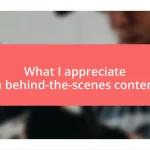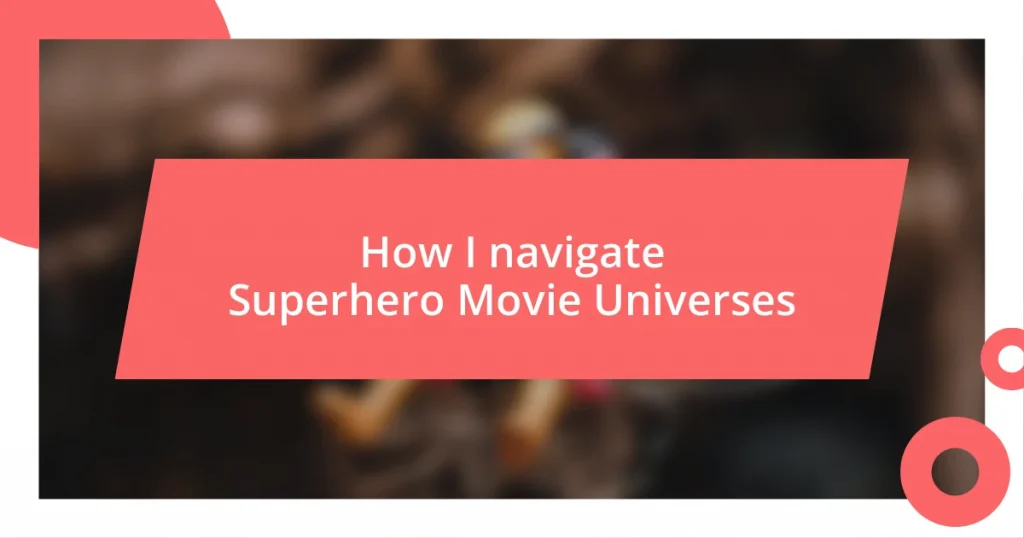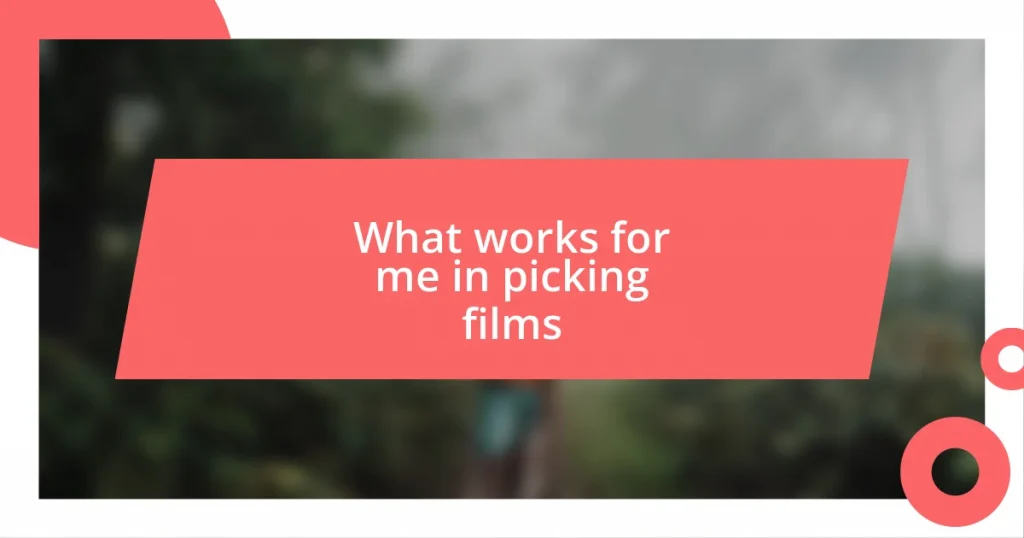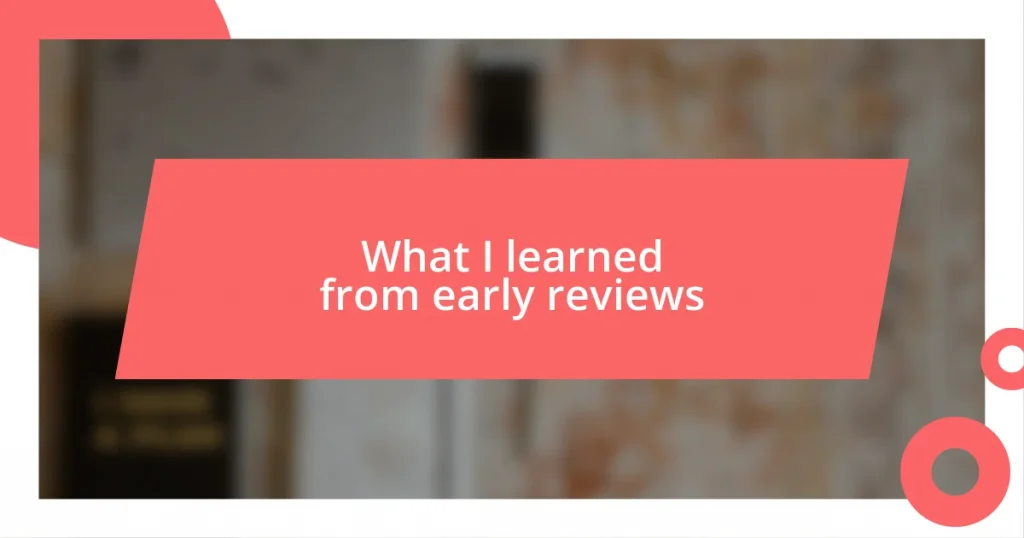Key takeaways:
- Understanding superhero movie universes enhances the viewing experience by recognizing character arcs, societal issues, and moral dilemmas that resonate with personal struggles.
- Key franchises like the MCU, DCEU, and X-Men create interconnected narratives, fostering community among fans and enhancing discussions on plot developments and character choices.
- Engaging in fan theories and community discussions deepens appreciation for the narratives while creating meaningful connections with others who share a passion for superhero stories.
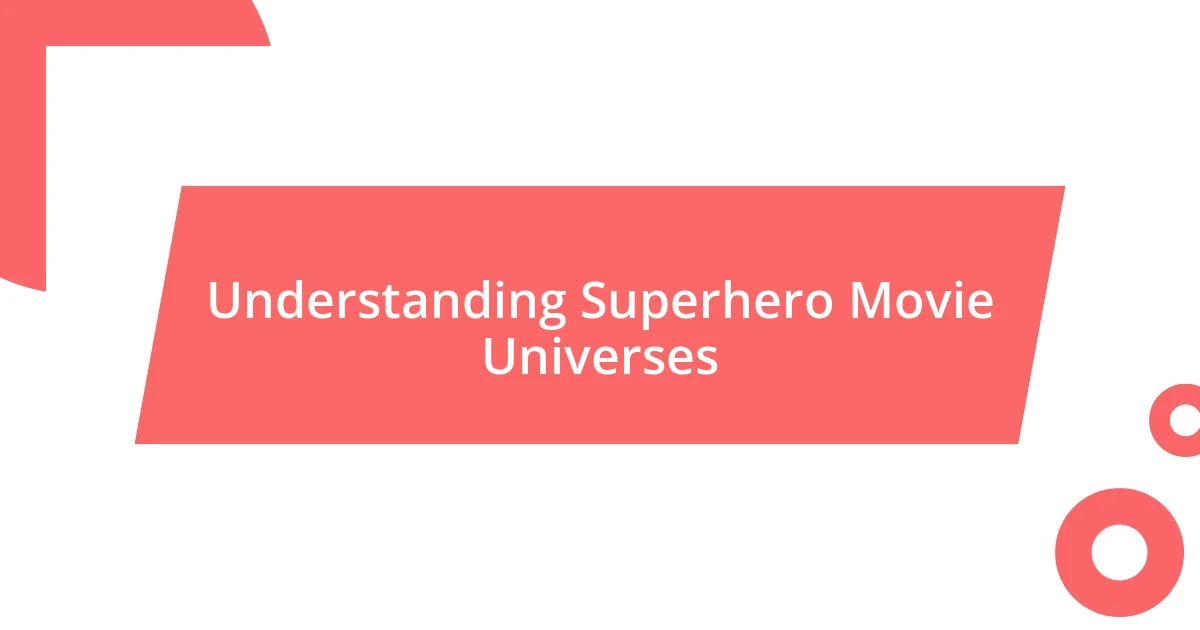
Understanding Superhero Movie Universes
Understanding superhero movie universes can sometimes feel like exploring a vast multiverse filled with intricate connections and narratives. I remember the first time I watched “The Avengers” and felt a rush of excitement when characters from different films came together on screen. It’s not just about the action but also about how these films weave their stories, creating a rich tapestry of lore that pulls the viewer in.
Each superhero franchise has its own unique rules, timelines, and character arcs, making it essential to grasp the overarching themes. For example, I often find myself mulling over the moral dilemmas faced by heroes like Spider-Man or Batman. How do their choices reflect our own struggles? These questions deepen my appreciation for the complexity of their stories and allow me to connect emotionally with their journeys.
As I dive deeper into these universes, I appreciate how they reflect societal issues. Take “Black Panther,” for instance—it goes beyond entertainment by addressing themes like identity and belonging. Have you ever watched a film that made you reflect on your own life? I often leave the theater with thoughts swirling in my head, pondering how a superhero’s fight can mirror our own personal battles. Understanding these layers elevates the viewing experience, transforming mere entertainment into a meaningful exploration of humanity.
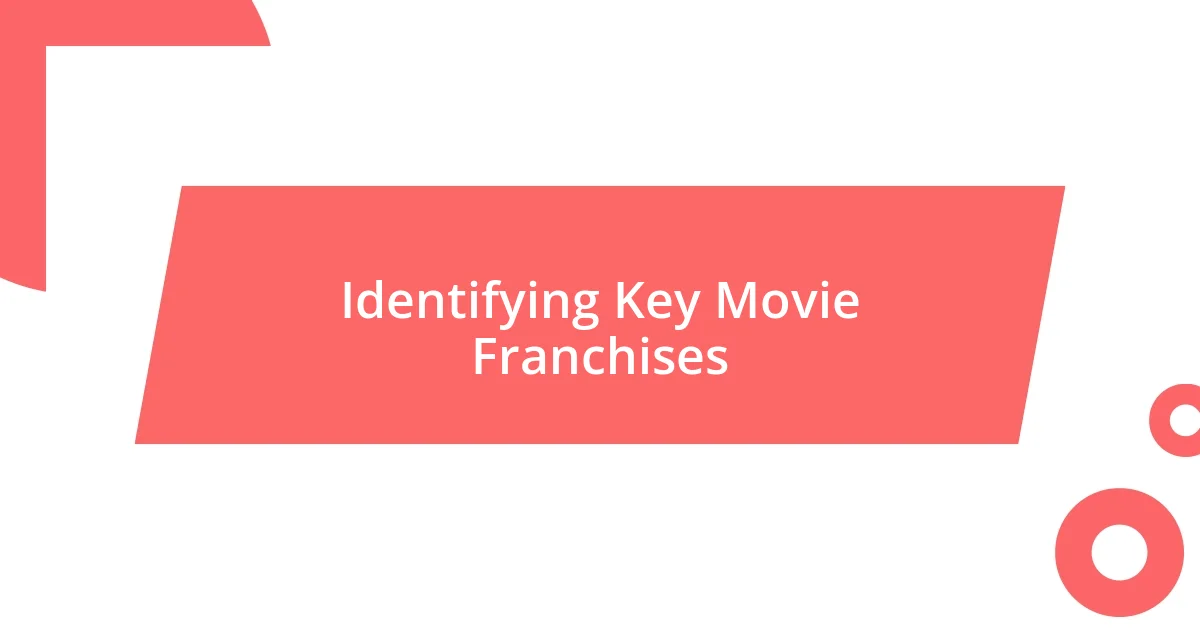
Identifying Key Movie Franchises
Identifying key movie franchises is like mapping out a galaxy filled with interconnected worlds. I’ve found that focusing on the major players helps to make sense of the sprawling narratives. For instance, the Marvel Cinematic Universe (MCU) is a behemoth, with numerous films and TV shows that intertwine over a long timeline. Conversely, the DC Extended Universe (DCEU) presents its own unique continuity, which sometimes stands apart in terms of tone and storytelling. Recognizing these franchises is essential when immersing oneself in superhero movies.
Here’s a quick list of the most influential superhero movie franchises I often refer to:
- Marvel Cinematic Universe (MCU): A multi-billion-dollar franchise famous for its crossover events.
- DC Extended Universe (DCEU): Known for its darker themes and standalone films, yet impactful in its own right.
- X-Men Universe: This franchise has its roots in the comic book tradition, exploring themes of prejudice and acceptance.
- Spider-Man Films: Varied interpretations across different actors and settings, showcasing the character’s evolving story.
- The Dark Knight Trilogy: Christopher Nolan’s films brought a gritty realism that redefined superhero cinema.
Every time I settle in for a Marvel movie marathon, I’m reminded of the excitement that comes from recognizing familiar faces and callbacks to previous films. It’s all about continuity and building anticipation for what’s to come. The connections within these franchises create a sense of community among fans, fostering lively discussions about plot twists or character arcs. Have you ever found yourself debating the significance of a post-credits scene with a friend? Those conversations make the experience even more enjoyable.
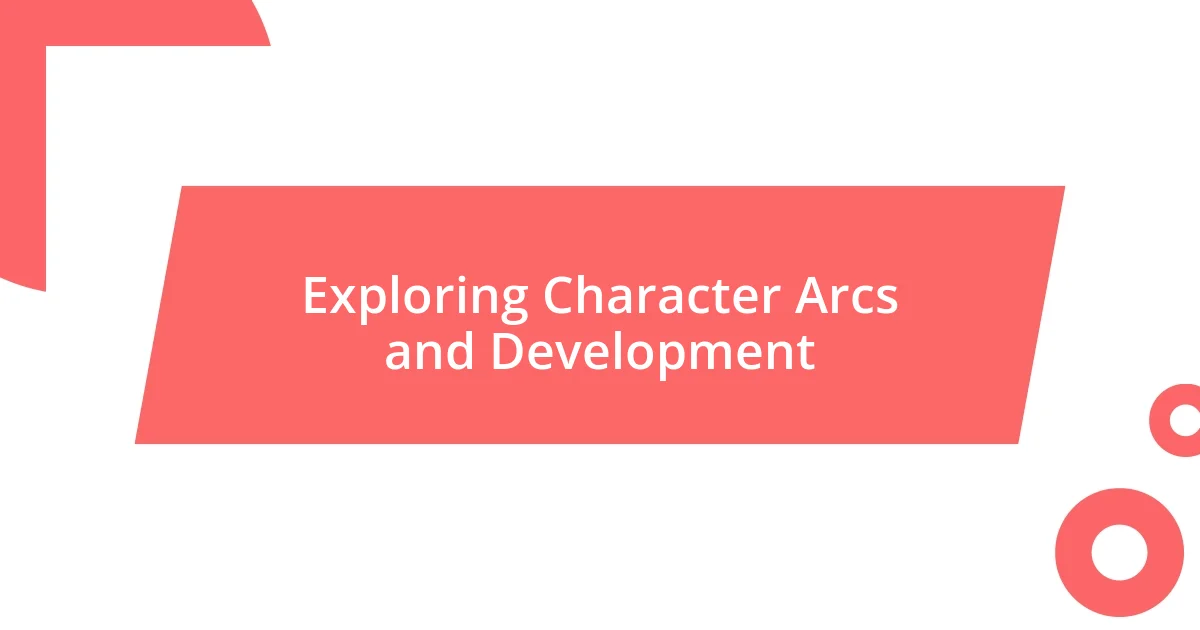
Exploring Character Arcs and Development
Character arcs are one of the most compelling aspects of superhero movies. I find it fascinating to witness how characters evolve over time. For example, Iron Man’s transformation from a self-centered billionaire to a self-sacrificing hero resonates deeply with me. It’s like watching someone grow up right before your eyes, confronting their flaws and rising to challenges that test their character. Can you recall a moment in a film where a character surprised you with their development? Those pivotal moments leave a lasting impression.
Looking at character development, I often appreciate the contrasts between heroes and villains. The Joker, for instance, serves as a dark mirror to Batman’s ideals. I remember feeling both fascinated and horrified when I first saw Heath Ledger’s portrayal. It made me ponder how circumstances can shape someone into a villain. This duality enriches the narrative, inviting viewers to reflect on what makes a hero versus a villain. Have you ever thought about who the real antagonist is in a story? It’s not always as straightforward as it seems.
Now, let’s compare some key character arcs from popular superhero franchises. Visualizing these differences can sharpen one’s understanding of character development in these narratives.
| Character | Arc Overview |
|---|---|
| Iron Man (Tony Stark) | Growth from narcissism to selflessness, ultimately sacrificing for the greater good. |
| Spider-Man (Peter Parker) | Struggles with the duality of being a hero and a regular teenager, learning responsibility through loss. |
| Batman (Bruce Wayne) | Confronts trauma and builds a dark persona while grappling with his moral code. |
| Joker (Arthur Fleck) | Tragic fall from grace leading to chaotic embodiment of societal rejection and insanity. |
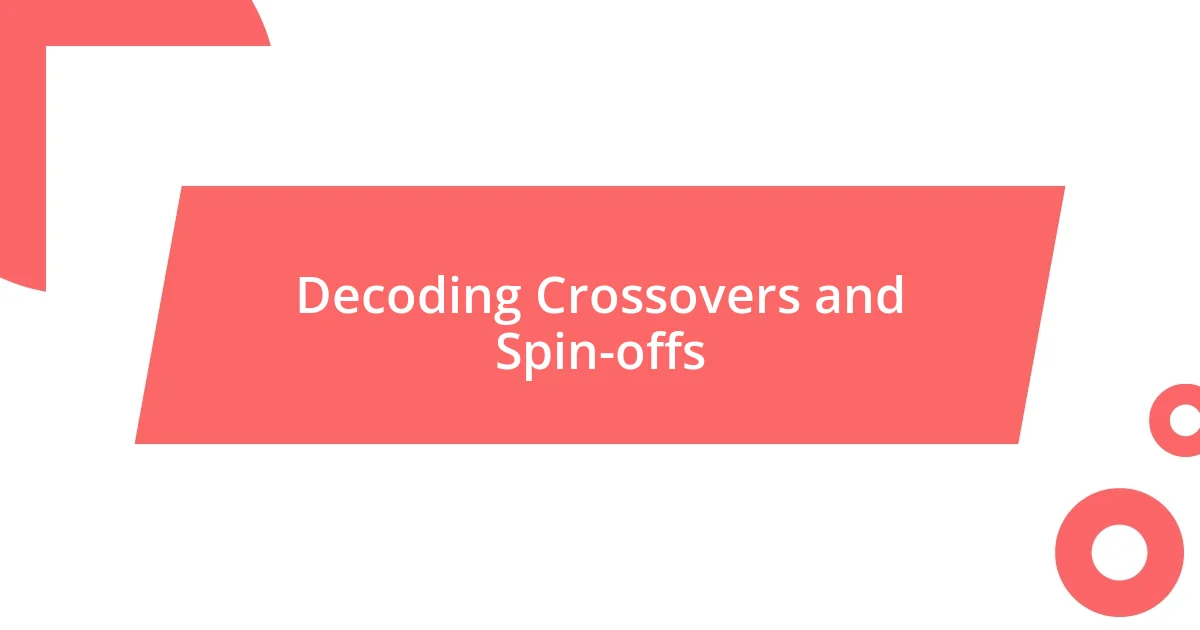
Decoding Crossovers and Spin-offs
Crossovers and spin-offs in superhero movie universes can feel like an exhilarating puzzle. I remember eagerly anticipating the release of a superhero crossover event, like Avengers: Endgame. It’s that electrifying moment when familiar characters come together, and I can’t help but wonder how their stories intertwine. Are you as excited as I am to see how they respond to each other’s quirks and conflicts? It’s a thrill that adds depth to the viewing experience.
Spin-offs often provide a new lens through which we can appreciate characters we’ve come to love. For example, WandaVision not only expanded on Wanda Maximoff’s journey but also delved into themes of grief and identity. I was drawn in by the show’s unique format, blending sitcom nostalgia with deeper emotional undercurrents. How often do you get to see a superhero grapple with such profound issues while still engaging in light-hearted antics? It’s refreshing and reminds me that there are layers to these characters beyond their heroics.
Navigating this complex web of crossovers and spin-offs requires a bit of investment. I think back to when I first encountered The Flash on television, only to see the character appear in the cinematic universe later. Suddenly, I was pulled into discussions about timelines, alternate realities, and character motivations across different media formats. Have you ever felt overwhelmed trying to keep track of these narratives? It’s all part of the journey and, in my experience, it makes the reward of understanding these universes that much sweeter.

Utilizing Fan Theories and Insights
Fan theories can serve as treasure maps for navigating the intricate landscapes of superhero movie universes. I often find myself diving into online forums or discussions, where fans dissect every detail, creating compelling narratives that sometimes feel more vivid than the films themselves. Have you ever stumbled upon a fan theory that completely changed your perspective on a character or storyline? I remember reading a theory about WandaVision that tied in elements from the comics, and it opened my eyes to the depth of Wanda’s powers and the tragic weight she carries.
Insights from dedicated fans can illuminate hidden connections that the casual viewer might miss. For instance, after watching Spider-Man: No Way Home, I explored various YouTube videos analyzing the multiverse implications, which brought a whole new level of excitement to the film for me. Seeing how fans piece together clues from various installments makes the viewing experience feel like a community quest. It’s amazing to be part of something larger, isn’t it? Discussing these theories with friends fosters a sense of connection, as we unravel the complexities together.
Moreover, engaging with fan theories can elevate our own understanding and appreciation of these narratives. I regularly challenge myself to think critically, asking questions like, “What if the filmmakers intended this twist all along?” This mindset not only sharpens my analytical skills but also fuels my passion for superhero stories. Don’t you find that the more you explore these theories, the more satisfying it becomes to watch the films with this new knowledge? It’s like going back to the source material with fresh eyes, ready to uncover even more surprises.
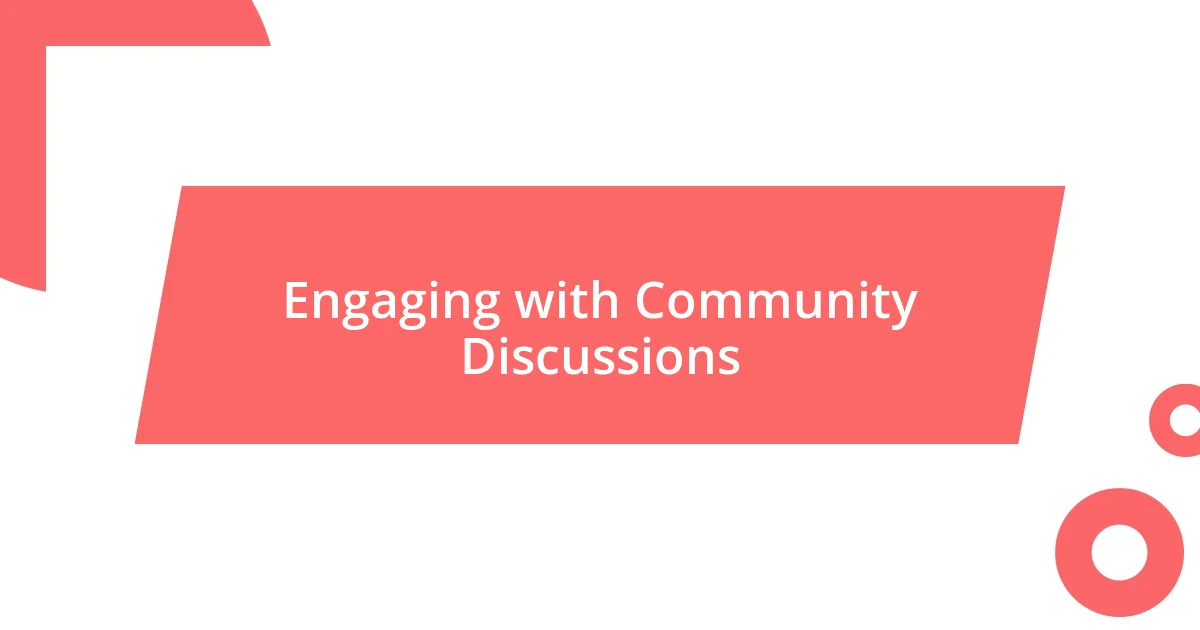
Engaging with Community Discussions
Engaging with community discussions related to superhero movie universes can transform your viewing experience into something truly special. I vividly remember joining an online chat after watching Zach Snyder’s Justice League. The excitement of hearing diverse opinions and interpretations felt electric, and I found myself nodding along as others expressed thoughts that I hadn’t yet considered. Isn’t it remarkable how sharing different perspectives can breathe new life into our favorite films?
What I’ve often discovered is that these discussions are not just about defending our favorites but also about unraveling our shared love for these stories. I once attended a local superhero movie marathon, followed by an open forum for fans to express their views on character arcs and themes. Everyone contributed something unique, and I realized how similar our passion was, despite varying opinions. Who would have thought that a simple movie could forge such meaningful connections?
Participating in these community discussions has taught me the value of constructive debate. There was a time when I was hesitant to voice my opinions, fearing backlash. However, I’ve since learned that respectful exchanges can really enrich our understanding of the narratives at play. Have you ever surprised yourself by changing your viewpoint after a conversation with a passionate fan? For me, each discussion deepens my appreciation for the storytelling craft and creates a sense of belonging in this vibrant community of superhero enthusiasts.

Creating Your Viewing Schedule
Creating a viewing schedule for superhero movies can feel overwhelming, given the sheer volume of content available across various franchises. What works for me is to designate specific nights for movie marathons or series binges. For example, I often dedicate Sunday evenings to dive into a particular universe, letting me immerse myself in the characters and storyline without interruption.
I also find it helpful to align my viewing schedule with upcoming releases. Have you ever planned a viewing party for a new movie launch? I did this for Black Panther: Wakanda Forever, inviting friends over for a pre-screening of the first Black Panther. It charged the atmosphere with excitement and gave us a chance to discuss our thoughts and theories beforehand. Looking ahead at release dates can help you build anticipation and coordinate viewing experiences that heighten the overall enjoyment.
It’s essential to balance the excitement of watching these films with real-life commitments. Sometimes, I’ll jot down a watch list but then find my schedule requires adjusting. Perhaps you’ve had a similar experience? When things get too busy, I prioritize my top picks and save others for a rainy day. This way, I still engage with the superhero universe without feeling like it’s a chore. Achieving this balance has not only made my viewing more enjoyable but has also allowed me to savor each movie or series as a mini-event.







